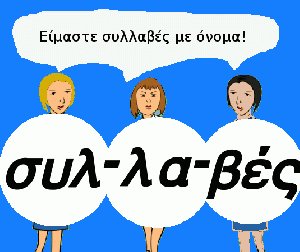Difference between revisions of "Language/Modern-greek-1453/Grammar/Syllabification"
| Line 1: | Line 1: | ||
[[File:Συλλαβισμός - Εκπαιδευτικό βίντεο.gif|thumb | [[File:Συλλαβισμός - Εκπαιδευτικό βίντεο.gif|thumb]] | ||
= | <div style="font-size:200%;">Spelling rules in Greek </div> | ||
Each word is composed of several parts, the syllables | |||
Example: πα–τέ-ρας (the father) | Example: πα–τέ-ρας (the father) | ||
The separation of a word into syllables is called spelling. | |||
==Spelling rules== | |||
*1) A vowel may be just a syllable in a word. | |||
π.χ. ά-νε- μος , (wind) γρα-φεί-ο (office) | |||
Two consecutive vowels are separated. | |||
π.χ. α-ε-τός, (eagle) ή-ρω-ας (heros) | |||
*2) A consonant being between two vowels, | |||
Spelling rules | |||
π.χ. | |||
π.χ. | |||
goes with the second vowel: | goes with the second vowel: | ||
π.χ. α-γά-πη (amour ), έ-χω (avoir ) | |||
π.χ. α- | *3) Two identical consonants are separated. | ||
π.χ. κόκ-κι-νο (red), μέ-λισ-σα (bee) | |||
*4) Two consonants are not separated if they begin with a Greek word. | |||
π.χ. έ-πι-πλο (furniture) , ά-στε-ρι (star) | |||
*5) But if they do not begin with a Greek word then they are separated | |||
π.χ. | π.χ. πόρ- τα, (door) στιγ-μή (dot) | ||
*6) The same happens when we have 3 consonants in a sequence. | |||
π.χ. έ-πι- | |||
π.χ. | |||
They are not separated when a Greek word begins from the first two. | They are not separated when a Greek word begins from the first two. | ||
π.χ. α- στρα-πή (thunder) , ε-χθρός (enemy) | |||
π.χ. α- | στρα-τός (army) χθ εσινός (previous) | ||
*7) But if no Greek word starts from the first two consonants, they are separated. | |||
π.χ. άν-θρω-πος, Νο-έμ-βρι-ος | |||
*8) The diphthongs (αι, ει, οι, ου, υι), | |||
the conjonctions : αυ και ευ, the double consonants (μπ, ντ, γκ, τα, τζ), the double vowels (αη, οη, άι, όι), and the abused diphthongs (ια, ιο, ιου, ειος, εια, ειο, οιος, οια, οιο, υα, υου) are not separated. π.χ. παι-δεί-α, ναυ-τι-κό, τα-μπέ-λα, κε-λαη-δά, κά-ποιος, λα-λιά, | |||
π.χ. | |||
the | |||
π.χ. παι-δεί-α, ναυ-τι-κό, τα-μπέ-λα, κε-λαη-δά, κά-ποιος, λα-λιά, | |||
γυά-λα, στα-χυού | γυά-λα, στα-χυού | ||
*9) les mots composés sont divisés en ses éléments | |||
π.χ. κα-τέ-χω, ε-πί-λο-γος | π.χ. κα-τέ-χω, ε-πί-λο-γος | ||
==Name of words (depending on the number of syllables)== | |||
*a) monosyllables (1 syllabe) | |||
π.χ. και, με, ναι | |||
*b) dissyllables (2 syllables) | |||
π.χ. ό-χι,(no) μέ-σα, (in) πι-κρός (bitter) | |||
*c) trisyllables (3 syllables) | |||
π.χ. | |||
π.χ | |||
π.χ. κα-ρέ-κλα, (chair) γρα-φεί-ο (office) | π.χ. κα-ρέ-κλα, (chair) γρα-φεί-ο (office) | ||
*d) polysyllabes (more than syllabes) | |||
π.χ. πο-δή-λα- το (bike) φω-το-γρα-φεί-ο (photograph) | |||
==Syllables names== | |||
*1) 1) The last syllable of a word is called an ending | |||
π.χ. πο-δή-λα- το (bike) | Π.χ τι-μή (honor) | ||
*2) The penultimate syllable is said to be conceding. | |||
π.χ. με – λέ – τη (study) | |||
*3) The third syllable from the end is said to be a prelude. | |||
Π.χ άν-θρω- πος (man) | |||
*A) The first syllable of a word is called the original syllable. | |||
π.χ. κα-ρα-μέ-λα | |||
*B) No multi-word word is emphasized above the foreword! | |||
Π.χ τι- | Π.χ οι-κό-πε-δο (field) | ||
π.χ. με | |||
Π.χ | |||
π.χ. | |||
Π.χ οι- | |||
Revision as of 18:01, 6 August 2018
Each word is composed of several parts, the syllables Example: πα–τέ-ρας (the father) The separation of a word into syllables is called spelling.
Spelling rules
- 1) A vowel may be just a syllable in a word.
π.χ. ά-νε- μος , (wind) γρα-φεί-ο (office) Two consecutive vowels are separated. π.χ. α-ε-τός, (eagle) ή-ρω-ας (heros)
- 2) A consonant being between two vowels,
goes with the second vowel: π.χ. α-γά-πη (amour ), έ-χω (avoir )
- 3) Two identical consonants are separated.
π.χ. κόκ-κι-νο (red), μέ-λισ-σα (bee)
- 4) Two consonants are not separated if they begin with a Greek word.
π.χ. έ-πι-πλο (furniture) , ά-στε-ρι (star)
- 5) But if they do not begin with a Greek word then they are separated
π.χ. πόρ- τα, (door) στιγ-μή (dot)
- 6) The same happens when we have 3 consonants in a sequence.
They are not separated when a Greek word begins from the first two. π.χ. α- στρα-πή (thunder) , ε-χθρός (enemy) στρα-τός (army) χθ εσινός (previous)
- 7) But if no Greek word starts from the first two consonants, they are separated.
π.χ. άν-θρω-πος, Νο-έμ-βρι-ος
- 8) The diphthongs (αι, ει, οι, ου, υι),
the conjonctions : αυ και ευ, the double consonants (μπ, ντ, γκ, τα, τζ), the double vowels (αη, οη, άι, όι), and the abused diphthongs (ια, ιο, ιου, ειος, εια, ειο, οιος, οια, οιο, υα, υου) are not separated. π.χ. παι-δεί-α, ναυ-τι-κό, τα-μπέ-λα, κε-λαη-δά, κά-ποιος, λα-λιά, γυά-λα, στα-χυού
- 9) les mots composés sont divisés en ses éléments
π.χ. κα-τέ-χω, ε-πί-λο-γος
Name of words (depending on the number of syllables)
- a) monosyllables (1 syllabe)
π.χ. και, με, ναι
- b) dissyllables (2 syllables)
π.χ. ό-χι,(no) μέ-σα, (in) πι-κρός (bitter)
- c) trisyllables (3 syllables)
π.χ. κα-ρέ-κλα, (chair) γρα-φεί-ο (office)
- d) polysyllabes (more than syllabes)
π.χ. πο-δή-λα- το (bike) φω-το-γρα-φεί-ο (photograph)
Syllables names
- 1) 1) The last syllable of a word is called an ending
Π.χ τι-μή (honor)
- 2) The penultimate syllable is said to be conceding.
π.χ. με – λέ – τη (study)
- 3) The third syllable from the end is said to be a prelude.
Π.χ άν-θρω- πος (man)
- A) The first syllable of a word is called the original syllable.
π.χ. κα-ρα-μέ-λα
- B) No multi-word word is emphasized above the foreword!
Π.χ οι-κό-πε-δο (field)
